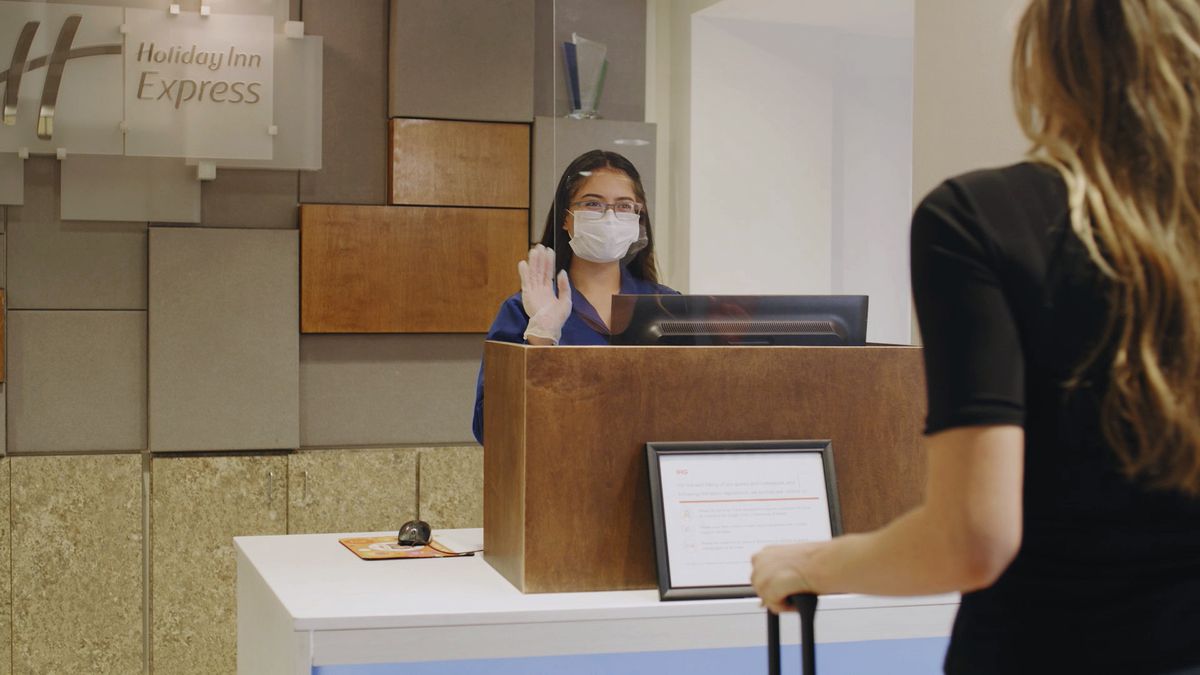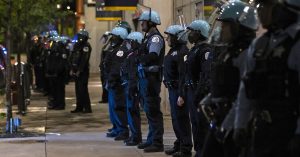The latest
Hotels make key changes to encourage guest stays amid coronavirus fears
Marriott, Hilton and other big hotel companies are used to competing on price or perks. Now they are competing on cleanliness.
From masked clerks at the front desk to shuttered buffets, hotels are making visible changes in the wake of the pandemic. Signage will tout new cleaning regimens: Red Roof Inns promise “RediClean,” while Hilton boasts of “CleanStay with Lysol.”
Hotels are still mostly empty; in the U.S., occupancy stood at 37% the week ending May 30, down 43% from the same period a year ago, according to STR, a data and consulting firm. But leisure travel is starting to pick up, and hotels see cleaning standards as a way to soothe jittery guests — and possibly win back business from rivals like home-sharing companies like Airbnb.
“I think, more than ever, customers are going to be looking for that seal of approval,” said Phil Cordell, Hilton’s head of global new brand development, who is leading the group developing the company’s new cleaning standards.
Some hotel brands are more stringent than others, says Larry Yu, a professor of hospitality management at George Washington University. He notes that Accor Hotels, a French company, has developed accreditation standards that its hotels must meet in order to reopen.
But Yu said enhanced cleaning is happening everywhere.
News
10:47 a.m. When can CPS athletes begin summer workouts? Unclear
Chicago Public Schools athletes are still waiting to see when they can begin summer workouts.
Athletic directors in CPS received an email on Sunday that made it seem as if the district would not allow schools to participate in the the IHSA’s first stage of return-to-play. But Monday afternoon, CPS officials said that the email that was sent out isn’t the district’s official position.
“The district has not yet released official guidance regarding return to play for sports but in light of new guidelines from IHSA, we are working diligently to develop guidance and protocols to ensure our students can safely begin training,” said CPS spokesperson Emily Bolton.
Stage 1 of the IHSA’s plan mandates that temperatures be monitored at the start of the workouts and recommended that trainers be onsite.
Phillips football coach Troy McAllister says that CPS is probably destined to lag behind the rest of the state due to practicalities.
“Those things are difficult for CPS to set up,” McAllister said. “It is such a big district. Who is going to provide temperature testing? Smaller districts can get that done immediately and funding is probably better for the athletic departments.”
Read the full story from Michael O’Brien here.
9:40 a.m. Can tear gas and pepper spray increase virus spread?
Police departments have used tear gas and pepper spray on protesters in recent weeks, raising concern that the chemical agents could increase the spread of the coronavirus.
The chemicals are designed to irritate the mucous membranes of the eyes, nose and throat. They make people cough, sneeze and pull off their masks as they try to breathe.
Medical experts say those rushing to help people sprayed by tear gas could come into close contact with someone already infected with the virus who is coughing infectious particles. Also, those not already infected could be in more danger of getting sick because of irritation to their respiratory tracts.
There’s no research on tear gas and COVID-19 specifically, because the virus is too new. But a few years ago, Joseph Hout, then an active duty Army officer, conducted a study of 6,723 Army recruits exposed to a riot control gas during basic training. The study found a link between that exposure and doctors diagnosing acute respiratory illnesses.
Could tear gas lead to an increase in coronavirus infections? “I think it’s plausible, yes,” Hout said Monday.
7:43 a.m. McCormick Place loses biggest show of the year
Bowing to the inevitable impact of COVID-19, sponsors of the International Manufacturing Technology Show canceled the event Monday. It was supposed to be the largest convention on McCormick Place’s calendar for 2020.
Scheduled for Sept. 14-19, the biennial affair was to have drawn more than 129,000 people to Chicago. It also served as an unofficial kickoff to what ordinarily is a busy fall convention season in Chicago; its cancellation could cause other organizations to drop or postpone their physical events set for later this year.
Under Gov. J.B. Pritzker’s plan for reopening the economy amid the pandemic, conventions could not happen until the state reaches Phase 5 of the recovery plan. It’s currently in Phase 3, and Phase 5 can’t occur until there’s a vaccine or effective treatment of COVID-19 and “the elimination of any new cases over a sustained period,” according to published guidelines.
Reporter David Roeder has the full story.
7:05 a.m. Farm-to-table dining takes on new meaning amid pandemic
The farm-to-table movement in the United States has grown in recent years, as consumers have increasingly demanded locally sourced food. But in the past several weeks, the movement has grown out of necessity because some producers can’t rely on the complex web of processors, distributors and middlemen to get food to customers.
For some, the challenges have turned into opportunities — and new customers.
“When restaurants reopen, we’ll probably keep doing home delivery, because we’ve got a good base of customers,” Pray said.
But it’s not good news for many of America’s food producers. In late April and early May, U.S. beef and pork processing capacity was down 40% from last year, according to Jayson Lusk, head of the department of agricultural economics at Purdue University. Plants are now mainly back online but at reduced capacity with beef and pork plants running about 10% to 15% below last year, he said.
New cases
Analysis & Commentary
8:04 a.m. I’m a suburban teacher, and many of my students are losing out with remote learning
In a letter to the Sun-Times editors, Tara Ehrenberg of Melrose Park writes:
Thank you for covering the challenge of educating students during the pandemic. I am a third grade teacher in Melrose Park. Many of my students are among millions in the U.S. who aren’t getting the same educational opportunities as their peers because they lack adequate digital access.
It’s been challenging to switch to e-learning. I am missing 25% of my class because not all of my students have access to technology. They may have cell phones, but they don’t have internet access to the abundance of online resources available to schools right now.
That puts them at a disadvantage because their fellow classmates are able to watch educational videos or play educational games, while they’re just completing worksheets I give them.
Our superintendent had to ask for permission from the state government to allow teachers in schools to prepare learning packets for our students. We are going to school every two weeks to provide work for our students who can’t complete their learning online.



















